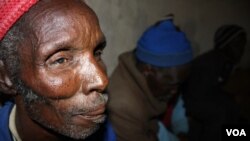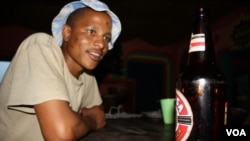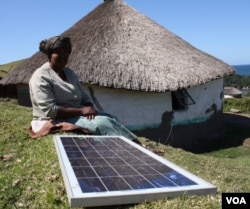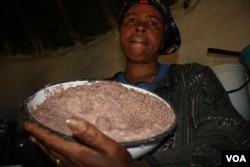BULUNGULA, SOUTH AFRICA —
This is Part One of a five-part series Continue to Parts: 1 / 2 / 3 / 4 / 5
It’s just turned nine in the morning in the mud hut on top of the hill, and the beer is flowing freely. Old men sit on buckled wooden benches along the soil-streaked walls of the informal tavern, taking turns gulping from a plastic bucket that once contained acrylic paint.
The men, mostly aged from 60 to their late 80s, are drinking umnandi – sorghum beer that the Xhosa people of South Africa’s Eastern Cape province have been making for centuries.
The air in the shebeen, or drinking den, hangs heavy with the brew’s sour odor, supplemented with a bite of salt from the nearby Indian Ocean, the sweetness of pipe tobacco and the acridness of smoke from an indoor cooking fire.
On a frayed straw mat in a dark corner of the building, a woman nurses a whimpering baby. In the world outside, skeletal chickens cackle and scrabble in the dirt; dogs bake in mute agony under the vicious sun; green hills tumble silently into the foaming sapphire sea.
There is an outburst of mirth and chatter as another bucket is filled. The laughter reaches a joyful crescendo when the chief of Nqileni village, Mabhokomela Bonakele, deadpans, “I came to the shebeen at seven this morning. But usually I only come late – at about nine in the morning.”
The drinkers are hard men, men who’ve spent their long lives breaking rock and being broken against it. They’re all retired miners. They wear their suffering in crooked spines and calcified eyes, irises milky from decades spent squinting underground and hands toughened like a carapace. Their teeth are askew and yellow; they’ve never had the luxury of dental care and have never wanted to know it.
The men often clear their throats fiercely and cough deeply and gutturally, courtesy of the rough slurry of sorghum they liberally pour down their wrinkled gullets.
According to statistics gathered by scientists, this part of the Eastern Cape has an extremely high incidence of throat cancer because of all the thick, gritty beer the people drink. But the men in the shebeen today are not men of science and they do not care for statistics. They only care about fellowship, lubricated by the sharing of traditional brew and made possible by meager pensions. It is, after all, what they have toiled for their entire lives.
Extreme drinking
Drinking homemade beer in this way is an intrinsic part of the Xhosa lifestyle; more specifically it’s what makes a Xhosa male a “real man,” said Mwelo Denjana, one of the elderly patrons of the shebeen.
While drinking copious amounts of umnandi and umqombothi [fermented maize] will result in inebriation, the brews have low alcohol content when compared with bottled beers. Their consumption is usually not associated with public drunkenness, said Bonakele.
“Swigging back traditional beer is more about facilitating a social occasion, like oiling the wheels of community life, and forming friendships and gossiping,” said Dave Martin, who as the owner of a tourist lodge in the Bulungula district is the region’s biggest employer.
But in recent years, Martin has watched as drinking patterns here have changed.
“When people do drink, especially young people, it’s always extreme. There’s no concept of – have one or two beers and then go home and just be merry. It’s either you go and get absolutely hammered, or you don’t go drinking at all.”
“When I drink, I drink like the other people here. I drink as many beers as I can,” said Dali Maleyile, a Nqileni resident in his early 20s.
As in many parts of South Africa, community leaders in Bulungula blame the excessive abuse of alcohol largely on rising unemployment, and corresponding boredom and frustration. Economic recession, worsened by labor unrest, means the mines to the north are no longer hiring many men from the Eastern Cape.
In this area, it’s estimated that 90 percent of adults are unemployed.
Traumatizing violence
In Bulungula, the rise in “extreme” drinking has resulted in a corresponding rise in violent incidents – almost always involving alcohol consumed at shebeens run solely by women.
“There’s usually no trouble in the shebeens where there’s a father that’s head of the household and he’s in charge of it. If there are problems, he would kick out the troublemakers. No one’s ever going to get stabbed at his house; it never happens. You come there as a guest of his, you buy your beer and you respect his rules,” said Martin.
As poverty has worsened in the district, so many men have left for other parts of the country in search of jobs, leaving women whose only possibility of earning an income is to open a shebeen.
“Those shebeens are known to sell to you no matter what. No matter what the circumstances, if you’ve got money they’ll sell you a beer,” said Martin.
He explained that the women are so desperate for money that they’ll sell alcohol to people who are already drunk, and when violence occurs, there isn’t a prominent male figure on hand to stop the trouble.
“The reality is we [the lodge] have provided the ambulance service for this area for the last eight years and so I have personally had to transport friends, both alive and dead, to hospital or to the morgue and had to fetch bodies…[people] killed for stupid, stupid stuff,” Martin told VOA.
“You get sent into an open area with 20 or 30 bodies lying naked on trollies and then you have to go find your body. And then [with] the [victim’s] brother, to hold [the body] by the ankles and you by the wrists and then swing him into the coffin…and he’s leaking fluids; he’s stabbed…and then wrap him in his blanket and put him in his coffin….”
Turning point
But, in November 2011, something happened that would have severe repercussions – good and bad – for the people of Nqileni, and would lead to acute action against alcohol-fueled violence.
“Six young men got into a fight in a shebeen here,” explained Nomzingisi Hopisi, health manager at the local Bulungula Incubator NGO. “They were drinking at first then there was an argument between them. Then they started fighting; then the other one ran away. Then they followed him. Two of those killed the guy [by stabbing him]. They were not having mercy upon the person. They killed him. He died next to the river. There is a shebeen there.”
A community meeting followed the murder.
“We as the elders decided that enough is enough; there had been too much violence. We said all shebeens must close at the latest at seven in the evening and no alcohol is to be sold and consumed after this time,” said Chief Bonakele.
The anti-alcohol rule, the first of its kind in South Africa, has transformed village life. The drinking curfew is unique because it’s enforced not by state authorities, but by the community itself.
“Before this law, there were killings when people were drinking in the evenings. Now when someone is drunk but the shebeen is closed, he can’t drink anymore so he just goes to sleep. Before, people drank until the early hours of the mornings and they got into fights, with knives, and killed each other. That now is not happening,” said Bonakele.
“There’s no doubt that the rule has been a huge success, especially in terms of the general number of problems caused by excessive drinking, and people here now are spending less money on alcohol, which means they’ve got more money for other more important things,” said Martin.
Community elder Bhasiqhongolo Dodwana reflected the uniform view of older Nqileni residents when he said, “I’m very happy about this rule. I got very upset about all the trouble happening here at night. Now there is peace here.”
But not everyone is happy with the rule, and not all of its effects are positive.
Forced rule
Dali Maleyile said while the drinking curfew has virtually eliminated violence in Nqileni, “one hundred percent” of young villagers maintain that it’s unfair.
“For youngsters it’s wrong because we would still like to enjoy ourselves after working. Later on they want to drink something, but then around seven it [the shebeen] is closed and they can’t,” said Maleyile.
“As for us [as Nqileni youngsters] we feel bad, because seven is too early...Only a few young people caused trouble, but now we all have to pay for their sins,” said another local youngster, Bongz Olo.
As is the norm in rural Xhosa society, where youngsters seldom have a voice, they weren’t consulted when the rule was debated and then implemented.
“We forced the shebeen owners to close their places at seven in the evening because the youths were killing one another. We don’t really care what the young people say or what they think. We don’t have to negotiate with them. Our aim is to stop all this violence. What we have done is for the good of everyone,” said Bonakele.
“For young people, I can understand their frustration [because] basically it says they’re never going to have a party in the rest of their life, which is quite harsh – very harsh,” Martin acknowledged.
Other than an amateur soccer league in the district, there’s little recreation in Nqileni. Late-night parties, accompanied by alcohol use, represented youngsters’ only escape from tedium. But it’s a route that’s now closed.
Binge drinking
Martin said an unintended consequence of the anti-alcohol curfew – but one that should have been foreseen – has been that it’s changed drinking patterns in Nqileni somewhat, and has resulted in people starting to drink earlier than they would have previously.
At three PM on a recent Friday afternoon, a group of young men, including Maleyile and Olo, was seated at the bar of Martin’s lodge. The party began in earnest when Yvonne Chaka Chaka’s hit song, Umqombothi, began blasting from the sound system.
As the South African songstress sang, “Everybody come and drink my magic African beer,” the young men laughed and admitted they were drinking as much as possible before the seven o’clock deadline.
“This rule is not good for people’s health. We never used to drink so much and so fast,” said Olo.
But even staunch opponents of the cut-off time acknowledge that despite an apparent rise in bingeing, the rule has effectively eradicated alcohol-related violence in Nqileni.
“People still get drunk before seven at night but then they go home and they sleep it off because there is nowhere else to go now that the shebeens are closed,” said Mabhuti Makawusi [23].
Implications for shebeens
Nozethile Nkwaza [47] laughed as she declared her tavern to be “the only sun powered shebeen in South Africa!” After a few hours of being exposed to sunshine, her solar panel is ready to power the radio she uses to attract customers.
Nkwaza described operating a shebeen as “hard work.” But, she added, “It’s the only way I know of making a bit of extra money. Men here like drinking traditional beer. I like their money. That is what I know.”
She opens every morning at nine, and said she closes as soon as her clock strikes seven in the evening.
Nkwaza usually makes about 50 liters of sorghum beer at a time, and each 50 liters makes her about 200 rand [US$ 25] profit. “Sometimes I sell 50 liters in one day, sometimes I sell 50 liters in a week,” she said.
Nkwaza shouted, “So much!” when asked how the curfew has affected her business.
“The way that people now buy beer is different. The people buy beer much faster during the day because they know that the shebeen is going to close at seven. So I am not losing money. Sometimes I even make more money now, because people try to drink as much as possible before I close at seven,” she said.
Nongezile Mdibanto [62] has a shebeen a few hills away from Nkwaza’s. While serving a drink, she proudly displayed her top seller, Old Buck gin, but simultaneously declared, “Business has been very bad this year. This has been my worst year since I opened this shebeen 14 years ago.”
Mdibanto blamed the “no drinking after seven PM law” for her predicament.
Broken law
Some Nqileni residents are adamant that some shebeen owners and drinkers are disobeying the rule.
“Not everyone is practicing the rule, because people are still selling beers, past eight, past nine. You can find people -- they are drunk even at past nine, past ten,” said Nomzingisi Hopisi. “There are shebeen owners who are not following the rule, but I don’t want to name them.”
Dali Mayelile said, “Some shebeens cheat. I’ve seen them. But I can’t mention names…They cheat because they want money.”
Dave Martin explained, “We have had a couple of meetings where someone has been found to have sold [alcohol after seven PM]. There was someone who was selling at quarter past seven, for instance, and she got quite heavily punished. She was fined [100 rand] and given a warning that if it happens again, then she’s not allowed to sell [liquor] for two years, which would be her source of income gone. She would struggle, very much.”
Martin acknowledged that the rule as it presently stands is “a bit too rigid” and could be modified in the near future, specifically around festive periods such as Easter, Christmas and New Year’s celebrations.
But, at the moment, Nqileni and its residents are enjoying one of the lowest crime rates in South Africa. And even critics of the curfew say it’s brought peace to the village.
This is Part One of a five-part series Continue to Parts: 1 / 2 / 3 / 4 / 5
It’s just turned nine in the morning in the mud hut on top of the hill, and the beer is flowing freely. Old men sit on buckled wooden benches along the soil-streaked walls of the informal tavern, taking turns gulping from a plastic bucket that once contained acrylic paint.
The men, mostly aged from 60 to their late 80s, are drinking umnandi – sorghum beer that the Xhosa people of South Africa’s Eastern Cape province have been making for centuries.
The air in the shebeen, or drinking den, hangs heavy with the brew’s sour odor, supplemented with a bite of salt from the nearby Indian Ocean, the sweetness of pipe tobacco and the acridness of smoke from an indoor cooking fire.
On a frayed straw mat in a dark corner of the building, a woman nurses a whimpering baby. In the world outside, skeletal chickens cackle and scrabble in the dirt; dogs bake in mute agony under the vicious sun; green hills tumble silently into the foaming sapphire sea.
There is an outburst of mirth and chatter as another bucket is filled. The laughter reaches a joyful crescendo when the chief of Nqileni village, Mabhokomela Bonakele, deadpans, “I came to the shebeen at seven this morning. But usually I only come late – at about nine in the morning.”
The drinkers are hard men, men who’ve spent their long lives breaking rock and being broken against it. They’re all retired miners. They wear their suffering in crooked spines and calcified eyes, irises milky from decades spent squinting underground and hands toughened like a carapace. Their teeth are askew and yellow; they’ve never had the luxury of dental care and have never wanted to know it.
The men often clear their throats fiercely and cough deeply and gutturally, courtesy of the rough slurry of sorghum they liberally pour down their wrinkled gullets.
According to statistics gathered by scientists, this part of the Eastern Cape has an extremely high incidence of throat cancer because of all the thick, gritty beer the people drink. But the men in the shebeen today are not men of science and they do not care for statistics. They only care about fellowship, lubricated by the sharing of traditional brew and made possible by meager pensions. It is, after all, what they have toiled for their entire lives.
Extreme drinking
Drinking homemade beer in this way is an intrinsic part of the Xhosa lifestyle; more specifically it’s what makes a Xhosa male a “real man,” said Mwelo Denjana, one of the elderly patrons of the shebeen.
While drinking copious amounts of umnandi and umqombothi [fermented maize] will result in inebriation, the brews have low alcohol content when compared with bottled beers. Their consumption is usually not associated with public drunkenness, said Bonakele.
“Swigging back traditional beer is more about facilitating a social occasion, like oiling the wheels of community life, and forming friendships and gossiping,” said Dave Martin, who as the owner of a tourist lodge in the Bulungula district is the region’s biggest employer.
But in recent years, Martin has watched as drinking patterns here have changed.
“When people do drink, especially young people, it’s always extreme. There’s no concept of – have one or two beers and then go home and just be merry. It’s either you go and get absolutely hammered, or you don’t go drinking at all.”
“When I drink, I drink like the other people here. I drink as many beers as I can,” said Dali Maleyile, a Nqileni resident in his early 20s.
As in many parts of South Africa, community leaders in Bulungula blame the excessive abuse of alcohol largely on rising unemployment, and corresponding boredom and frustration. Economic recession, worsened by labor unrest, means the mines to the north are no longer hiring many men from the Eastern Cape.
In this area, it’s estimated that 90 percent of adults are unemployed.
Traumatizing violence
In Bulungula, the rise in “extreme” drinking has resulted in a corresponding rise in violent incidents – almost always involving alcohol consumed at shebeens run solely by women.
“There’s usually no trouble in the shebeens where there’s a father that’s head of the household and he’s in charge of it. If there are problems, he would kick out the troublemakers. No one’s ever going to get stabbed at his house; it never happens. You come there as a guest of his, you buy your beer and you respect his rules,” said Martin.
As poverty has worsened in the district, so many men have left for other parts of the country in search of jobs, leaving women whose only possibility of earning an income is to open a shebeen.
“Those shebeens are known to sell to you no matter what. No matter what the circumstances, if you’ve got money they’ll sell you a beer,” said Martin.
He explained that the women are so desperate for money that they’ll sell alcohol to people who are already drunk, and when violence occurs, there isn’t a prominent male figure on hand to stop the trouble.
“The reality is we [the lodge] have provided the ambulance service for this area for the last eight years and so I have personally had to transport friends, both alive and dead, to hospital or to the morgue and had to fetch bodies…[people] killed for stupid, stupid stuff,” Martin told VOA.
“You get sent into an open area with 20 or 30 bodies lying naked on trollies and then you have to go find your body. And then [with] the [victim’s] brother, to hold [the body] by the ankles and you by the wrists and then swing him into the coffin…and he’s leaking fluids; he’s stabbed…and then wrap him in his blanket and put him in his coffin….”
Turning point
But, in November 2011, something happened that would have severe repercussions – good and bad – for the people of Nqileni, and would lead to acute action against alcohol-fueled violence.
“Six young men got into a fight in a shebeen here,” explained Nomzingisi Hopisi, health manager at the local Bulungula Incubator NGO. “They were drinking at first then there was an argument between them. Then they started fighting; then the other one ran away. Then they followed him. Two of those killed the guy [by stabbing him]. They were not having mercy upon the person. They killed him. He died next to the river. There is a shebeen there.”
A community meeting followed the murder.
“We as the elders decided that enough is enough; there had been too much violence. We said all shebeens must close at the latest at seven in the evening and no alcohol is to be sold and consumed after this time,” said Chief Bonakele.
The anti-alcohol rule, the first of its kind in South Africa, has transformed village life. The drinking curfew is unique because it’s enforced not by state authorities, but by the community itself.
“Before this law, there were killings when people were drinking in the evenings. Now when someone is drunk but the shebeen is closed, he can’t drink anymore so he just goes to sleep. Before, people drank until the early hours of the mornings and they got into fights, with knives, and killed each other. That now is not happening,” said Bonakele.
“There’s no doubt that the rule has been a huge success, especially in terms of the general number of problems caused by excessive drinking, and people here now are spending less money on alcohol, which means they’ve got more money for other more important things,” said Martin.
Community elder Bhasiqhongolo Dodwana reflected the uniform view of older Nqileni residents when he said, “I’m very happy about this rule. I got very upset about all the trouble happening here at night. Now there is peace here.”
But not everyone is happy with the rule, and not all of its effects are positive.
Forced rule
Dali Maleyile said while the drinking curfew has virtually eliminated violence in Nqileni, “one hundred percent” of young villagers maintain that it’s unfair.
“For youngsters it’s wrong because we would still like to enjoy ourselves after working. Later on they want to drink something, but then around seven it [the shebeen] is closed and they can’t,” said Maleyile.
“As for us [as Nqileni youngsters] we feel bad, because seven is too early...Only a few young people caused trouble, but now we all have to pay for their sins,” said another local youngster, Bongz Olo.
As is the norm in rural Xhosa society, where youngsters seldom have a voice, they weren’t consulted when the rule was debated and then implemented.
“We forced the shebeen owners to close their places at seven in the evening because the youths were killing one another. We don’t really care what the young people say or what they think. We don’t have to negotiate with them. Our aim is to stop all this violence. What we have done is for the good of everyone,” said Bonakele.
“For young people, I can understand their frustration [because] basically it says they’re never going to have a party in the rest of their life, which is quite harsh – very harsh,” Martin acknowledged.
Other than an amateur soccer league in the district, there’s little recreation in Nqileni. Late-night parties, accompanied by alcohol use, represented youngsters’ only escape from tedium. But it’s a route that’s now closed.
Binge drinking
Martin said an unintended consequence of the anti-alcohol curfew – but one that should have been foreseen – has been that it’s changed drinking patterns in Nqileni somewhat, and has resulted in people starting to drink earlier than they would have previously.
At three PM on a recent Friday afternoon, a group of young men, including Maleyile and Olo, was seated at the bar of Martin’s lodge. The party began in earnest when Yvonne Chaka Chaka’s hit song, Umqombothi, began blasting from the sound system.
As the South African songstress sang, “Everybody come and drink my magic African beer,” the young men laughed and admitted they were drinking as much as possible before the seven o’clock deadline.
“This rule is not good for people’s health. We never used to drink so much and so fast,” said Olo.
But even staunch opponents of the cut-off time acknowledge that despite an apparent rise in bingeing, the rule has effectively eradicated alcohol-related violence in Nqileni.
“People still get drunk before seven at night but then they go home and they sleep it off because there is nowhere else to go now that the shebeens are closed,” said Mabhuti Makawusi [23].
Implications for shebeens
Nozethile Nkwaza [47] laughed as she declared her tavern to be “the only sun powered shebeen in South Africa!” After a few hours of being exposed to sunshine, her solar panel is ready to power the radio she uses to attract customers.
Nkwaza described operating a shebeen as “hard work.” But, she added, “It’s the only way I know of making a bit of extra money. Men here like drinking traditional beer. I like their money. That is what I know.”
She opens every morning at nine, and said she closes as soon as her clock strikes seven in the evening.
Nkwaza usually makes about 50 liters of sorghum beer at a time, and each 50 liters makes her about 200 rand [US$ 25] profit. “Sometimes I sell 50 liters in one day, sometimes I sell 50 liters in a week,” she said.
Nkwaza shouted, “So much!” when asked how the curfew has affected her business.
“The way that people now buy beer is different. The people buy beer much faster during the day because they know that the shebeen is going to close at seven. So I am not losing money. Sometimes I even make more money now, because people try to drink as much as possible before I close at seven,” she said.
Nongezile Mdibanto [62] has a shebeen a few hills away from Nkwaza’s. While serving a drink, she proudly displayed her top seller, Old Buck gin, but simultaneously declared, “Business has been very bad this year. This has been my worst year since I opened this shebeen 14 years ago.”
Mdibanto blamed the “no drinking after seven PM law” for her predicament.
Broken law
Some Nqileni residents are adamant that some shebeen owners and drinkers are disobeying the rule.
“Not everyone is practicing the rule, because people are still selling beers, past eight, past nine. You can find people -- they are drunk even at past nine, past ten,” said Nomzingisi Hopisi. “There are shebeen owners who are not following the rule, but I don’t want to name them.”
Dali Mayelile said, “Some shebeens cheat. I’ve seen them. But I can’t mention names…They cheat because they want money.”
Dave Martin explained, “We have had a couple of meetings where someone has been found to have sold [alcohol after seven PM]. There was someone who was selling at quarter past seven, for instance, and she got quite heavily punished. She was fined [100 rand] and given a warning that if it happens again, then she’s not allowed to sell [liquor] for two years, which would be her source of income gone. She would struggle, very much.”
Martin acknowledged that the rule as it presently stands is “a bit too rigid” and could be modified in the near future, specifically around festive periods such as Easter, Christmas and New Year’s celebrations.
But, at the moment, Nqileni and its residents are enjoying one of the lowest crime rates in South Africa. And even critics of the curfew say it’s brought peace to the village.




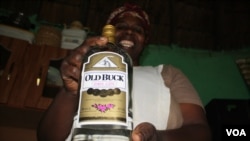
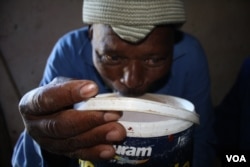
![Bulungula lodge owner Dave Martin, with his wife Rejane Woodroffe [courtesy Dave Martin]](https://gdb.voanews.com/DB83C2F7-45B3-4102-A9E4-4782469E6EA2_w250_r0_s.jpg)

